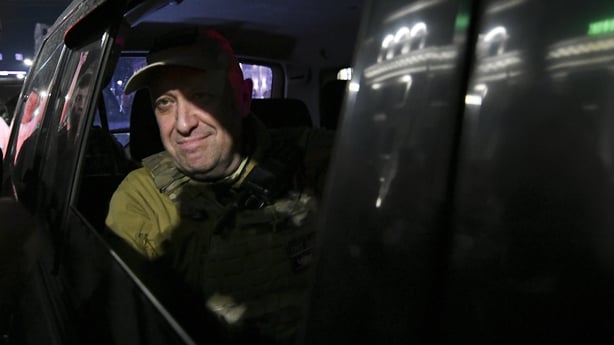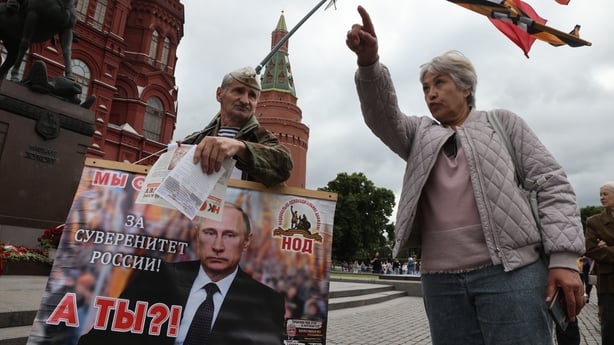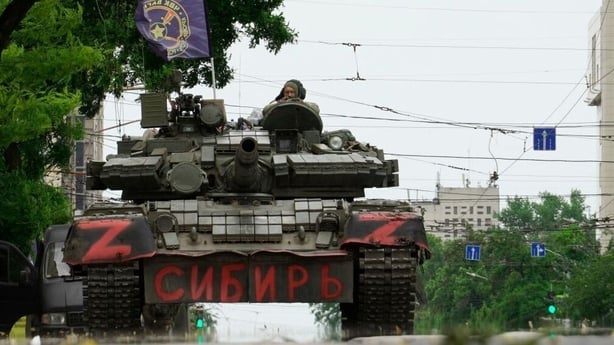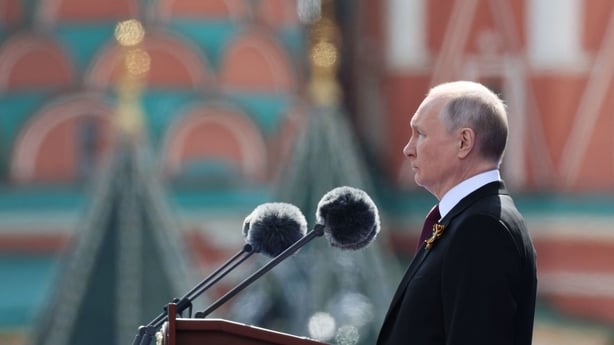Heavily armed Russian mercenaries withdrew from the southern Russian city of Rostov overnight under a deal that halted their rapid advance on Moscow but left unanswered questions about President Vladimir Putin's grip on power.
Ending their mutiny, fighters of the Wagner group headed back to their bases in return for guarantees for their safety.
Their leader, Yevgeny Prigozhin, will move to Belarus under the deal mediated by Belarusian President Alexander Lukashenko.
US Secretary of State Antony Blinken suggested the turmoil in Russia might not be over and could take months to play out, while Italy's foreign minister said it had shattered the "myth" of Russian unity.
Mr Putin has not made public comments since the deal was struck to ease the crisis.
State television released excerpts of an interview in which he said he was giving top priority to the conflict in Ukraine.
However the interview appeared to have been recorded before the mutiny and he made no reference to yesterday's events.
State television also said Mr Putin would attend a meeting of Russia's Security Council this coming week, without elaborating.
Mr Prigozhin, 62, was seen leaving the district military headquarters in Rostov - hundreds of miles south of Moscow - late yesterday in a sport utility vehicle.

His location today was not known.
Mr Prigozhin, a former Putin ally and ex-convict whose forces have fought the bloodiest battles of the 16-month war in Ukraine, said his decision to advance on Moscow was intended to remove corrupt and incompetent Russian commanders he blames for botching the war.

'Cracks' in the facade
Western leaders have expressed concern over the turmoil in Russia, which has the world's largest nuclear arsenal.
"We've seen more cracks emerge in the Russian facade. It is too soon to tell exactly where they go, and when they get there. But certainly, we have all sorts of new questions that Putin is going to have to address in the weeks and months ahead," Mr Blinken told NBC's 'Meet the Press' programme.
Mr Blinken also said the United States remained focused on "resolutely and relentlessly" helping Ukraine to defend itself and recover territory seized by Russia over the past 16 months.
Read more:
Wagner chief to leave Russia in deal to end crisis - Kremlin
How Putin's attempt to control Russia's private armies backfired
What we know about Russia's Wagner rebellion
China, a key ally of Russia, made no initial public reference to the turmoil, eventually saying after talks with a visiting senior Russian diplomat that it supported Russia's efforts to maintain its national stability.
After capturing Rostov - the main rear logistical hub for Russia's invasion of Ukraine - the mercenaries raced hundreds of miles north, in what Mr Prigozhin called a "march for justice", transporting tanks and armoured trucks and smashing through barricades set up to stop them, before the deal to withdraw was reached.
Videos shared on social media from Rostov overnight purportedly showed the mercenaries withdrawing in a convoy of armoured vehicles, tanks and coaches to the sound of cheers, chants of "Wagner" and celebratory gunfire from residents.
Reuters was able to verify the location of the video but not the date that it was filmed.
"Take care of yourselves," shouted one woman.

The show of support for Wagner's short-lived insurrection was striking in a country that is increasingly intolerant of public criticism of the president and his rule.
The mood on the streets of Rostov on was mainly one of relief.
"It was scary... Everyone is glad that nothing bad happened... It did not come to an armed clash," said one resident. "There are very serious problems in the country, and they need to be solved."
In Moscow, where there was little evidence of increased security, some expressed a measure of understanding for Wagner's position.
"The opinions of a person who has a certain weight in society should probably be heard by the authorities," said Oleg.
Tomorrow has been declared a non-working day in the Russian capital to allow time for things to settle.
Deal brokered
Under the deal, brokered late yesterday, Kremlin spokesman Dmitry Peskov said a criminal case opened against Mr Prigozhin for armed mutiny would be dropped, Mr Prigozhin would move to Belarus, and Wagner fighters who rallied to his cause would face no action, in recognition of their previous service to Russia.
In a televised address during Saturday's drama, the Russian president said the rebellion put the country's very existence under threat, vowing to punish those behind the revolt and drawing parallels with the chaos of 1917 that had led to the Bolshevik revolution.
Mr Prigozhin has for months accused Defence Minister Sergei Shoigu and the chief of the general staff, Valery Gerasimov, of incompetence and of withholding ammunition from his fighters as they battled to take Bakhmut in Ukraine.
Wagner, whose men in Ukraine include thousands of ex-prisoners recruited from Russian jails, has grown into a sprawling international business with mining interests and fighters in Africa and the Middle East.

This month, Mr Prigozhin defied orders to sign a contract placing his troops under Defence Ministry command. He launched the rebellion on Friday after alleging that the military had killed some of his men in an air strike. The Defence Ministry denied this.
Italy's Foreign Minister Antonio Tajani told Italian newspaper Il Messaggero that Mr Putin created the conditions for yesterday's insurrection by allowing Mr Prigozhin to build up such a formidable private army.
"The myth of the unity of Putin's Russia is over... It's the inevitable outcome when you support and finance a legion of mercenaries," Mr Tajani said in the interview.
"One thing is certain: the Russian front is weaker than yesterday. I hope that peace (in Ukraine) will now be closer."
The revolt came just weeks into the start of Ukraine's strongest counter-offensive drive since Moscow's invasion in February last year.

